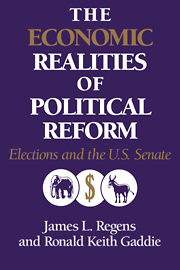Book contents
- Frontmatter
- Contents
- List of tables and figures
- Acknowledgments
- Abbreviations
- Introduction
- 1 The Senate in transition and campaign finance
- 2 Early money and profit taking in Senate campaigns
- 3 Targeting rent provision by major interests
- 4 Sitting in the cheap seats?
- 5 Implications for campaign-finance reform
- 6 Reform and the rent-seeking legislature
- Notes
- Bibliography
- Index
2 - Early money and profit taking in Senate campaigns
Published online by Cambridge University Press: 18 December 2009
- Frontmatter
- Contents
- List of tables and figures
- Acknowledgments
- Abbreviations
- Introduction
- 1 The Senate in transition and campaign finance
- 2 Early money and profit taking in Senate campaigns
- 3 Targeting rent provision by major interests
- 4 Sitting in the cheap seats?
- 5 Implications for campaign-finance reform
- 6 Reform and the rent-seeking legislature
- Notes
- Bibliography
- Index
Summary
As one-third would go out triennially, there would always be divisions holding their places for unequal terms and consequently acting under the influence of different views and different impulses.
James Madison Notes of Debates in the Federal Convention of 1787Among those “different views and different impulses” is the impulse to campaign for reelection. In a cyclical view of the matter, the impulse would be strongest in the class for which election day was closest at hand.
Richard F. Fenno The United States Senate: A Bicameral PerspectivePolitical scientists have devoted substantial energy to describing the roles played by the major political parties as well as political action committees (PACs) in funding congressional campaigns. Mirroring the assumption succinctly expressed by Madison in The Federalist Number 10 that self-interest motivates political behavior, the national parties and PACs have a strong incentive to provide financial support to their preferred candidates (Herrnson, 1989; Eismeier and Pollack, 1986a, 1986b). Under existing campaign regulations, we can readily observe similar benefit-seeking behavior among politicians, especially incumbents who attempt to exploit their office to garner financial support (Jacobson, 1989; Sabato, 1985). Although a myriad of factors may influence the ability of incumbents to acquire campaign contributions (see Munger, 1989; Poole and Romer, 1985; Gopoian, 1984), the conventional wisdom and empirical research suggest the motivation for legislators to engage in those market exchanges is primarily to protect their reelection prospects (Fiorina, 1989; Mayhew, 1974).
- Type
- Chapter
- Information
- The Economic Realities of Political ReformElections and the US Senate, pp. 26 - 55Publisher: Cambridge University PressPrint publication year: 1995

